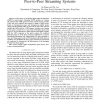Free Online Productivity Tools
i2Speak
i2Symbol
i2OCR
iTex2Img
iWeb2Print
iWeb2Shot
i2Type
iPdf2Split
iPdf2Merge
i2Bopomofo
i2Arabic
i2Style
i2Image
i2PDF
iLatex2Rtf
Sci2ools
123
Voted
INFOCOM
2011
IEEE
2011
IEEE
The digital rights management game in peer-to-peer streaming systems
—In this paper we model the digital rights management (DRM) for peer-to-peer streaming (P2PS) systems as a game. We construct the DRM game from both content service provider (CSP) and user’s aspects, and propose a design of DRM policy based on homogeneous peers and homogeneous digital goods, which gets the maximal utility for the CSP as well as the criterion whether the DRM is fit for a P2PS system. Another sort of games in this paper consider how a peer deals with digital goods with regard to various situations in P2PS systems with DRM, together with the CSP’s response to the peer’s actions. We construct different games to avoid three notorious misbehaviors of peers: freeriding, jailbreaking and whitewashing. We take examples to show how these games work in P2PS systems with DRM and how equilibria are established in these games. Numerical experiments are conducted to demonstrate the effectiveness of the strategies devised from these games.
Related Content
| Added | 30 Aug 2011 |
| Updated | 30 Aug 2011 |
| Type | Journal |
| Year | 2011 |
| Where | INFOCOM |
| Authors | Jin Zhang, Wei Lou |
Comments (0)

